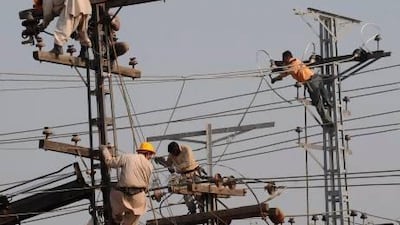PESHAWAR, Pakistan // A Pakistani power company is appealing to its customers' religious consciences in a desperate bid to get them to stop stealing electricity – a major hurdle in efforts to stem crippling blackouts.
The Peshawar Electric Supply Company (Pesco) has taken out front-page advertisements in three major newspapers in the country's north-west during Ramadan, reminding readers that stealing electricity is a sin.
"Do your fasting, pay zakat and serve your parents, but do these things by the light of legal electricity," the advert states.
"Clerics have ruled that doing good deeds by the light of stolen electricity is against Sharia, so let us stop using stolen electricity and beautify our day of judgement."
Across Pakistan, from cities to villages and from slums to upmarket neighbourhoods, people steal electricity every day, usually by means of a metal hook known as a "kunda" connecting the house directly to power lines in the street, bypassing the meter.
The country's prime minister, Nawaz Sharif, has ordered a clampdown on electricity thieves but they often work with the connivance of power company staff, and few people are prosecuted - hence Pesco's appeal to a higher authority.
Pakistan's power sector has been crippled by years of graft and underinvestment, leaving people to struggle with blackouts of up to 20 hours a day in the blistering summer.
Given the irregular service, many Pakistanis do not see why they should pay.
Amjad Ali, a welder living in a slum area of Karachi, says he cannot afford a regular connection but would not pay for one even if he could.
"If I get a connection, half of my monthly income would go in electric bills. I am not a fool to pay for their corruption and inefficiencies," he said.
People using electricity without paying for it is a major cause of a massive accumulation of debt between government-owned power utilities, electricity-generating companies and fuel suppliers, which lies at the heart of the crisis.
The blackouts have damaged industry and agriculture - shaving 2 per cent off GDP, according to the finance minister - and Mr Sharif's government, elected in May, has said finding a solution is its top priority.
Khawja Mohammad Asif, the minister for water and power, said his department was working closely with the finance ministry to find a way to clear the debt, which stands at 500 billion rupees (Dh31bn).
"It is a complex matter and would take a couple of months to be sorted out and we would clear off the circular debt by August," he said.
But even if such bullish predictions come true, Farhan Mahmood, head of research at Sherman Securities in Karachi, said the debt would mount up again to around 350bn rupees by June because of corruption and the theft.
All over Karachi, jumbles of hooks connect overhead lines to homes, adding the threat of electrocution to the perils of life in Pakistan's crowded, violent metropolis.
"The theft accounts for about 30 per cent in our system, inflicting heavy financial losses to our company," said a senior engineer of Karachi Electric Supply Company (Kesc).
For the rest of Pakistan "transmission and distribution losses", which include theft, run to 20 per cent according to the Water and Power Development Authority (Wapda).
The power crisis has led to friction between Pakistan's provinces, with Karachi, the biggest city and economic heart, and Punjab province, the industrial centre, accusing each other of using more than their fair share.
In the tribal districts along the Afghan border in the north-west, there is a widespread belief that locals are entitled to free electricity under an agreement struck in 1947 with Pakistan's founder, Mohammad Ali Jinnah, over the building of the Warsak Dam.
Even in the neighbouring Khyber Pakhtunkhwa, people consider free electricity as their birthright, saying the province generates most of the power for the rest of the country.
"You cannot call it a theft, it is our right," said Khan Ali, from Mohmand tribal district, where the Warsak Dam was built.
"Khyber Pakhtunkhwa produce the electricity, so we should be given some concession. The rest of the country is using our electricity, so why should we pay?"
Along with the kunda, another common way to steal power is by disabling the meter with a length of electrical wire, but a safer option is simply to bribe company officials.
Aftab Ahmed, from Rawalpindi, next to Islamabad, said people in his neighbourhood pay meter readers 1,000 rupees a month and never have bills over 1,000 rupees despite running air conditioners all night.
Shafiq Ahmed, a mechanic in Islamabad, has seen his bills tumble.
"I used to get high electricity bills - 3,000, 4,000 rupees, then one of my neighbours introduced me to the meter reader, and the monthly bill is never more than 700 rupees," he said.

